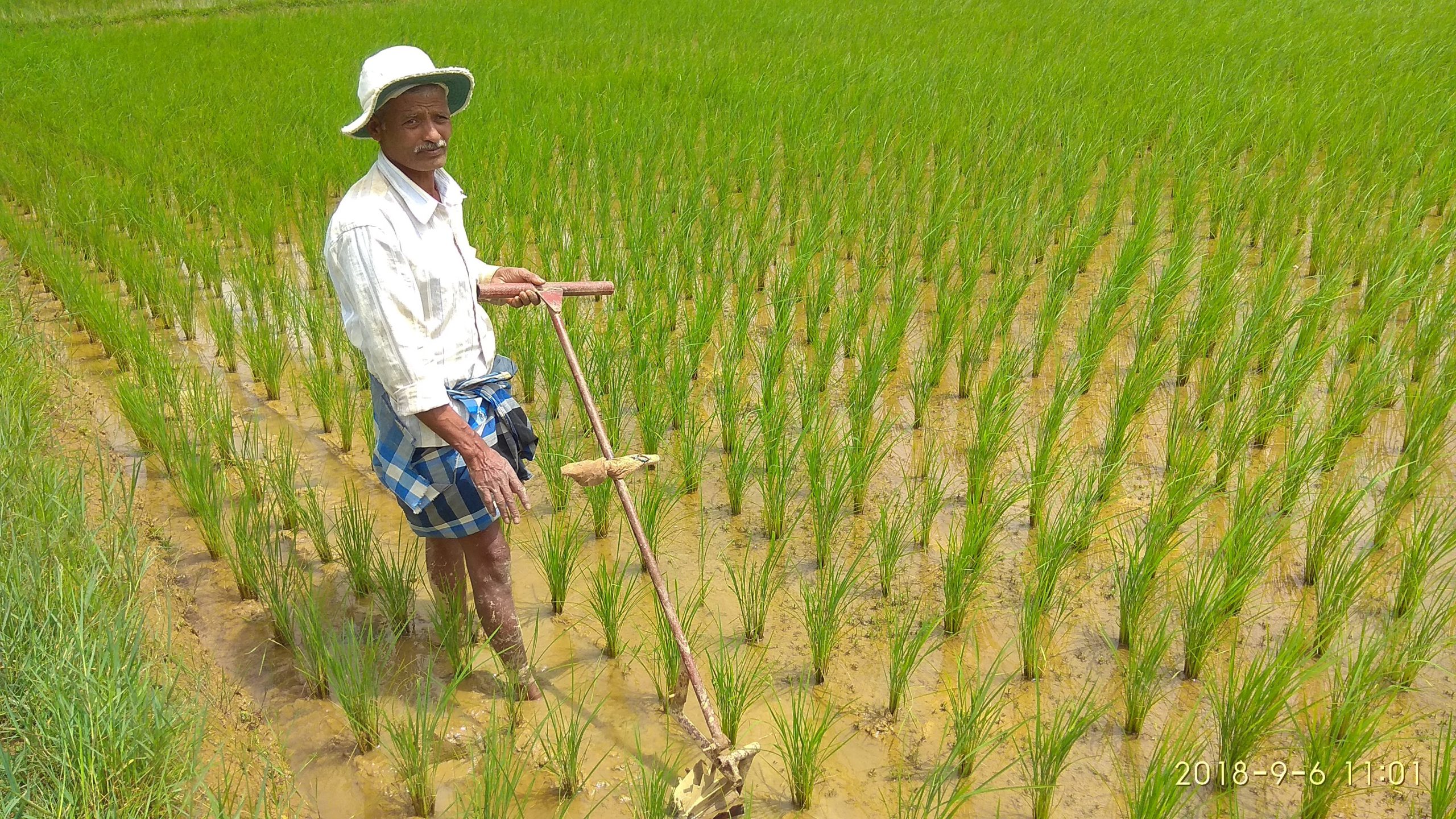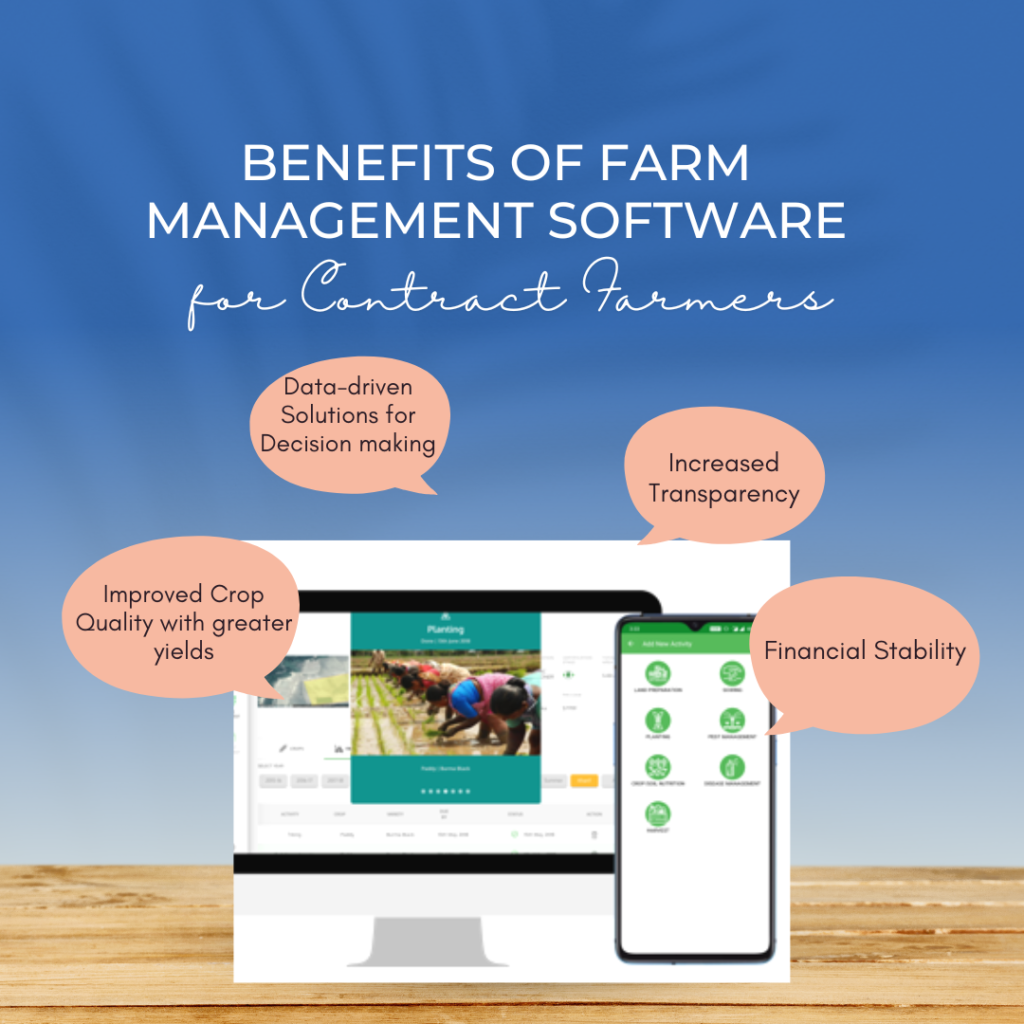Contact: +91 99725 24322 |
Menu
Menu
Quick summary: Discover how farm management solutions can help contract farmers optimize their operations, reduce waste, and increase profitability while minimizing their environmental impact. Our blog dives into the latest tools and strategies for data-driven decision-making, streamlined administrative tasks, and sustainable farming practices. Read on to take control of your farm's success with our expert insights and advice on farm management solutions.

According to the World Bank, do you know that contract farming involves over 50 million farmers worldwide and accounts for around 20% of all agriculture output globally? Sources from FAO suggest that contract farming has shown to increase yields up to 60% in some cases. Farm Management solutions are critical for the success of contract farmers. Access to information, resources, financing and enabling them to manage risks and track their performance, farm management solutions ensure that contract farming is beneficial to both farmers and the buyers.
Agriculture is a crucial sector providing food and income for millions around the world. Smallholder farmers in developing countries play a key role in food security. More than 475 million of the world’s farms operate on less than two hectares of land. Although these farms account for only 12 % of world’s farmland, they provide an estimated 80% of food produced in Asia and sub Saharan Africa
Despite the key role played, these smallholders are a vulnerable group often neglected by development policy and are affected with poverty and hunger. Contract farming is a system where farmers agree to produce crops or livestock for a buyer at a pre-determined price. This requires a proper farm management solution in place. This blog will explore the importance of farm management in contract farming, the challenges faced by contract farmers and the solutions available to improve their productivity, financial stability and sustainability.
Contract farming is a type of coordination between farmers and buyers, where a farmer agrees to produce a specific amount and quality of goods and deliver them to the buyer at a predetermined price. The goal of contract farming is to reduce the uncertainty and risks that farmers face, while improving their access to markets, inputs and technology. Contract farming has gained popularity as a tool for increasing market access, reducing transaction costs and improving farmer incomes.
Farm management is a critical aspect of contract farming which enables farmers to effectively manage their resources, reduce risks and improve their profitability. Farm management solutions help farmers to plan, monitor and evaluate their operations and make data driven decisions. These solutions also help farmers to effectively manage their resources on soil, water and other inputs, thereby reducing dependency on the buyer. Farm management helps farmers to realize better quality and quantity yields with adoption of sustainable agriculture practices that can lead to long term profitability. These solutions help farmers to achieve their objectives which in turn leads to sustainability and profitability.
Contract Farming provides a guaranteed market for their produce with a reduced risk of price volatility. The buyer is guaranteed of high-quality produce which can meet the demands of the consumer.
Contract farming if improperly managed, can lead to innumerable problems that may include abuse of power, market failures, environmental harm and falling incomes.
Contract farming can be viewed as a partnership between farmers and processing companies or cooperatives where the farmer is obligated to supply the agreed quantity and quality of crops in a specified time period. In return, the processing company agrees to buy the crops from the farmers at a pre-determined price. Farmers normally get into a contract to sell their harvest to the sourcing company and in turn get support in form of agriculture inputs, technical aid and financial help.
By working together, farmers and buyers can create a mutually beneficial relationship that benefits all.
Digital technology can provide various benefits to contract farmers by offering real-time data, monitoring and makes decision making simpler. An ERP platform based on digital technology can assist contract farmers by providing a streamlined process for creating, managing and updating contracts based on farmer profiles. The farm management software can simplify maintenance of input records, credits and tracking of procured crops.
Farm management platforms offer an integrated approach to farm management. These platforms use data and analytics to optimize farm operations, improve yields and reduce waste. Crop monitoring, inventory management and financial planning help farmers to track their contracts, inventory and production. Crop management helps farmers to monitor the growth of crops, detect pests and disease outbreaks and take remedial measures. The real-time data on weather, soil moisture and other variables that affect crop growth, enable farmers to take informed decisions about harvests.
GEFP was able to maximize their profits and improve the operational efficiency of the lettuce supply chain efficiency with our Farm Management Software.
Farm management mobile applications help farmers to manage their farms more effectively. The easy-to-use features and accessibility is a convenient solution for the farmers.
Geo-tagging of farms helps farmers to identify areas of variability and apply inputs more precisely to get higher yields with less wastage.
Crop agronomy helps contract farmers to optimize their use of input resources like water and fertilizers. The timely alerts on implementation of the package of practices helps farmers to increase efficiency and hence productivity.
Contract farming companies need to accurately deal with the inputs for a farm by supplying farmers with good quality inputs in sufficient quantities. This may be difficult to manage with multiple crops and farmers and can become a matter of concern. Farm management solutions help these companies to identify the correct inputs and manage them effectively across farms and crops.
With the rising competition, businesses need to streamline crop procurement operations postproduction. It is important for businesses to know the amount of crop produce received and in assessing the standard of produce. Procurement management helps in recording all the information regarding the crop that includes crop weight, quality, quantity and price. This helps businesses to evaluate farmer profits and provide necessary suggestions for improving their practices.
Financial solutions help farmers to access finance, manage risk and protect their livelihoods. They are protected from the risks of crop failures, pest attacks and adverse weather conditionTop of Form
Successful implementation of a farm management solution needs training and support to farmers. Farmers need to be trained to understand and utilize new technologies and systems. The problems faced needs to be addressed by proper support and training sessions.
TraceX’s Farm management solutions Trace Gro seamlessly manages farm operations, production, harvest and procurement thereby enhancing productivity and delivering quality. The user friendly, offline multilingual mobile app helps farmers to streamline their farm and crop activities to enable hassle-free production and harvests. The real-time capture of data helps farmers to take informed decisions and realize profitability. The solution offers farmer profiling solutions with workflows identified and training calendars to empower them to perform better and take advantage of the technology solutions.
TraceX is working with a number of contract farmer companies enabling them to increase their operational efficiency at reduced costs and increasing productivity.

Farm management solutions can help contract farmers to optimize their crop production by providing data on soil health, weather patterns and pest attacks. This results in better quality and quantity yields.
Farm management solutions provide farmers with real-time insights that helps in their decision-making process. The user-friendly mobile apps help farmers to track their crop yields, input costs, resource allocation and take informed decisions.
The recording of inputs at all stages in the supply chain builds traceability and increases transparency. This creates accountability of the sustainable practices used among stakeholders and helps in meeting regulatory standards.
Farm management solutions reduces risks by providing better access to finance and credit options. It serves as a safety net for farmers against market fluctuations and climate change that may result in crop failures.
Contract farming provides an opportunity for farmers to build sustainable agribusiness by providing them access to markets, inputs and technology. Technology is a critical component of farm management solutions and with advancements in IoT, AI/ML and blockchain, processes can be optimized to improve productivity. It is essential to identify the specific requirements and integrate them into existing systems. A successful implementation also requires necessary training and support. Leveraging technology, contract farming companies can build profitable and sustainable agribusinesses for optimal outcomes.
